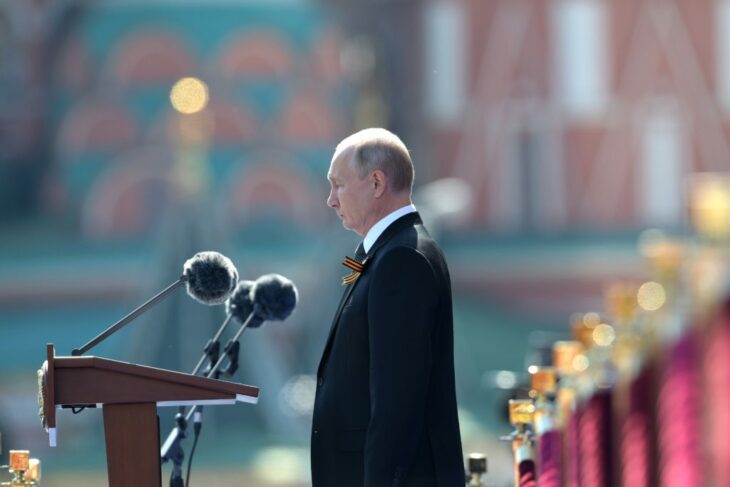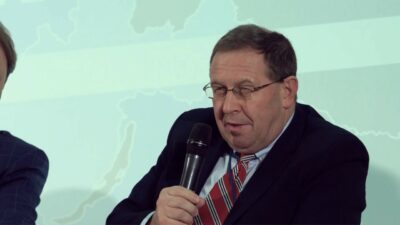With the Nord Stream 2 pipeline nearing completion, it’s time to ask what the Russian president will do next

Maximilian Terhalle is a visiting professor at the Grand Strategy Programme of King’s College London and former senior adviser to the U.K. Ministry of Defence. He recently published an IISS Adelphi paper on “The Responsibility to Defend: Re-thinking Germany’s Strategic Culture” with Bastian Giegerich.
Russian President Vladimir Putin has won the battle over the Nord Stream 2 pipeline. With U.S. President Joe Biden conceding last week that further sanctions were “not really useful” — given that 98 percent of the pipeline is already finished — German Chancellor Angela Merkel’s much criticized support for the project has finally borne fruit.
But once the digging on Nord Stream 2 is complete at the end of August, transatlantic strategists need to think even harder about the question underlying all these dynamics: Will Russia attack? And if so, when?
It is likely that Ukraine — at war since 2014 and deprived by the pipeline of even the minimal control it once had over Russia — is now doomed. Russia’s smaller neighboring NATO members are also rightly shivering, left wondering, yet again, how credible the alliance’s deterrence really is. And with good reason.
The Russian president is sure to have been emboldened by Germany’s persistent disregard for the sharp criticisms raised against the pipeline by Poland and the Baltic nations — not to mention Biden’s recent indication that Russia is a lesser security challenge for the U.S. than China.
Last week, Putin declared that it was the West’s supposed “anti-Russia project” that had galvanized him to write an article about why Russia and Ukraine were indeed one nation. The implication was clear: Sudetenland, Kuwait — is Ukraine now next?
Those who think the answer is “no” point to comments like former U.S. Secretary of Foreign Affairs Henry Kissinger’s, who stressed that Putin is not “a character like Hitler” in a 2018 Financial Times interview. Many observers continue to view any dissenting assessments as doomsaying. They feel vindicated by the fact that, for instance, former U.K. chief of staff at Land Command General Richard Shirreff’s prediction of a “2017: War with Russia” turned out to be flawed.
Former officials point to the iron law of NATO’s deterrence: Russia will not attack the alliance’s eastern flank as long as U.S. soldiers are stationed there — read: German, British or French ones wouldn’t matter. With former U.S. President Donald Trump gone, U.S. troops are here to say. So what’s all the fuss about?
Admiral James G. Stavridis provides one clue. In his book “2034: A Novel on the Next World War,” published with the American author Elliot Ackerman earlier this year, he describes an outbreak of a U.S.-China war. Stavridis — who had whole-heartedly endorsed Shirreff’s volume — does not connect his latest insights with Europe and Russia. But others have, even if perhaps unintentionally.
When James Mattis, then U.S. secretary of defense, was asked by the Senate in 2017 whether the U.S. could fight two major wars simultaneously, he responded, “No, Sir!” And that’s where Putin might be hopeful for an opportunity.
A U.S.-China war would likely absorb most, if not all, U.S. economic and military capabilities and, consequently, heavily undermine its credibility to provide deterrence in Europe. And because of that, such a conflict would provide Putin with the much longed-for opportunity to remedy Russia’s defeat at the end of the Cold War in 1991.
To be sure, whether a U.S.-China showdown will break out at all remains unknown. But it’s not possible to rule out that the ongoing competition could evolve into a massive conflagration, precisely because it is very unlikely that either side would be willing to concede power in any substantive way.
In the meantime, given Putin’s unscrupulous record, Europe, including the U.K., should not base its lofty reassurances to Ukraine on trust in the Russian leader.
Instead, they should prevent future attacks by acting on two levels: First, European powers should clearly demonstrate to Putin that they are willing to cut Russia off from the Belgium-based SWIFT system — the global network facilitating international bank transactions. Second, Europeans should rethink the possibility of concerting and enlarging their nuclear arsenals, in the shape of a Euro deterrent placed within NATO.
Putin’s Nord Stream 2 victory has struck a blow to NATO’s deterrence. Appeasement has won the day — but it should not have the last word.





